|
|
|
Sort Order |
|
|
|
Items / Page
|
|
|
|
|
|
|
| Srl | Item |
| 1 |
ID:
115109
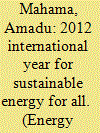

|
|
|
|
|
| Publication |
2012.
|
| Summary/Abstract |
2012 has been declared the "International Year for Sustainable Energy for All" by the UN. While Africa remains the most 'underpowered' continent, the prognosis for a brighter future is looking good, as key stakeholders (governments, private sector, civil society, and the donor community) have mobilized at an unprecedented scale to experiment with new policies, regulatory frameworks, and business models to rapidly upscale access to sustainable energy. The top-down, central grid expansion approach to increasing electricity access is very capital intensive and yet has gained considerable momentum at the expense of lower cost options that utilize decentralized off-grid solutions. A decentralized bottom-up approach could also use indigenous renewable energy sources and foster more significant linkages with livelihood opportunities in the rural un-served territories. This paper evaluates the emerging experiments through the lenses of C.K. Prahalad's "bottom of the pyramid" theory and Clayton Christensen's "disruptive technologies" perspective. Three front-runner initiatives involving new business models, innovative technologies, and institutional capacity building will be analyzed. In addition, the paper examines a regulatory policy initiative designed to stimulate clean energy investments in Ghana. Though the examples are all from Ghana, they illustrate general challenges to sub-Saharan Africa as a whole.
|
|
|
|
|
|
|
|
|
|
|
|
|
|
|
|
| 2 |
ID:
161519
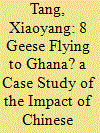

|
|
|
|
|
| Summary/Abstract |
China has significantly changed its engagement mode with Africa, shifting from trade of natural resources to investment in industrial sectors. This article uses Ghana as a case study to examine why and how Chinese investors come to set up factories in Africa’s challenging business environment. Through first-hand scoping study on the ground, the author reveals that the pressure of China’s industrial upgrading and the vast potential of Africa’s growing market are the main drives for Chinese manufacturers. Clustering and industrial zones proved to be effective instruments to help Chinese manufacturers grow in Ghana. The clustering of numerous small and medium-sized enterprises also facilitates linkage building between Chinese projects and the local economy. The ‘flying geese’ phenomenon is emerging in Ghana’s manufacturing sector, but the weak macro-economy and the lack of industrial supports largely slow down the progress of Chinese investments and reduce the spillover effects.
|
|
|
|
|
|
|
|
|
|
|
|
|
|
|
|
| 3 |
ID:
187435
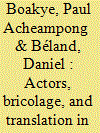

|
|
|
|
|
| Summary/Abstract |
Due to the centrality of education to economic growth and social development, successive governments in post-colonial Ghana have implemented policies to improve the quality of education in the country. In line with this, Ghana embarked on its first major education reform in 1987 under the Provisional National Defence Council (PNDC) government. While several studies have been conducted to explain this reform, these studies have largely been descriptive and theoretically, have over relied on the conditionality thesis. Our study draws on ideational literature and research interviews to offer an alternative explanation of the 1987 reform. Drawing extensively on the ideational concepts of bricolage and translation and focusing on the actors using these two mechanisms, the study argues that, while exogenous forces did impact the 1987 reform, it was mainly driven by endogenous factors featuring both path dependent and departing changes.
|
|
|
|
|
|
|
|
|
|
|
|
|
|
|
|
| 4 |
ID:
173790
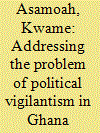

|
|
|
|
|
| Summary/Abstract |
Ghana entered into the Fourth Republic in 1993 after experiencing political instability over two decades. A defining feature that has characterized the Fourth Republic of Ghana and marred Ghana’s democratic credentials is the emergence of political vigilantism. Political vigilantism has basically been perpetuated by the two leading political parties in Ghana: the New Patriotic Party and National Democratic Congress. The major political actors in the political system of Ghana continue to express the debilitating effects of political vigilantism on Ghana’s democratic advancement, nevertheless, it continues to persist in monumental proportion in our political dispensation. Using a qualitative research approach, the paper examines the factors responsible for the pervasiveness of political vigilantism under the Fourth Republic of Ghana and proffer some plausible solutions to address this political canker.
|
|
|
|
|
|
|
|
|
|
|
|
|
|
|
|
| 5 |
ID:
168249
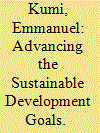

|
|
|
|
|
| Summary/Abstract |
In September 2015, the Sustainable Development Goals (SDGs) were endorsed by the United Nations General Assembly as the cardinal agenda for guiding future global development. In financing the SDGs, there has been an increasing call on stakeholder diversification by leveraging on other non-state actors and private finance including philanthropic institutions in influencing, delivering and advancing the SDGs. Drawing on insights from the Ghanaian philanthropic sector, I show that philanthropic institutions play complementary roles in service delivery, support civil society organisations to engage in active action and advocacy, and enhance paradigm shifts in development thinking around the SDGs. I argue for the need in embracing complexity thinking that recognises that the attainment of the SDGs is dependent on the creation of an enabling environment and effective multi-stakeholder consultation.
|
|
|
|
|
|
|
|
|
|
|
|
|
|
|
|
| 6 |
ID:
095465
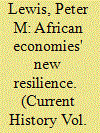

|
|
|
|
|
| Publication |
2010.
|
| Summary/Abstract |
Near-term prospects for the region's economies are encouraging when one considers the enormous shocks of the recent crisis and the depth of the global downturn.
|
|
|
|
|
|
|
|
|
|
|
|
|
|
|
|
| 7 |
ID:
118961
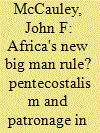

|
|
|
|
|
| Publication |
2013.
|
| Summary/Abstract |
The concept of 'big man rule', conventionally invoked to refer to a kinship-based relationship between patron and client, is now finding application in the charismatic Pentecostal movement in Africa. This article explores why new Pentecostalism emerges as an alternative to traditional clientelism, and how well the analogy of big man rule applies. It traces the Pentecostal form of big man rule to four socio-economic transformations: ongoing weakness in the state's ability to provide social welfare; a change in social values in the wake of the global financial crisis; expanding state control over customary activities; and urbanization. Drawing on data collected from both patrons and clients in Ghana, the article shows that Pentecostalism mirrors traditional big man rule by encouraging members to break from their past, to trust leadership, and to commit exclusively to their religious social network. Among church leaders, Pentecostalism also encourages internal competition and the provision of social services. Most importantly, the movement creates pay-off structures that replicate the exchange of resources for loyalty central to big man rule. The implication is that Pentecostalism's success as an alternative informal institution is not a function of Weberian ethics or occult spiritualities, but rather its ability to fill voids left by the state and to provide new social networks.
|
|
|
|
|
|
|
|
|
|
|
|
|
|
|
|
| 8 |
ID:
168243
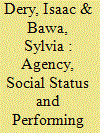

|
|
|
|
|
| Summary/Abstract |
This article examines contextually-grounded perspectives on the socio-political significance of marriage in contemporary Ghanaian society. Drawing on qualitative interviews among men and women in northwestern Ghana, this article argues that, beyond historicizing the institution of monogamous marriage, women’s agency in desiring, and navigating marriages are performatively agentic and tied to attaining a myriad of socio-cultural, economic and political capital. Situated within the constrained articulations of participants, our findings alert us to complex negotiations and manoeuvres through which men and women aspire for specific forms of masculinities and femininities within the larger gender hierarchies.
|
|
|
|
|
|
|
|
|
|
|
|
|
|
|
|
| 9 |
ID:
140331
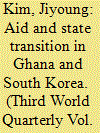

|
|
|
|
|
| Summary/Abstract |
This paper examines the questions of why and how foreign assistance was utilised successfully in South Korea but less so in Ghana, with a focus on the role of aid in the process of state building and state transition in these two countries. As multiple policy makers and scholars have noted, in 1957 South Korea and Ghana shared similar levels of GDP per capita, yet South Korea then achieved rapid economic development and democracy in one generation, while Ghana suffered from slow development and a general deterioration of the standard of living. In this study I adopt a comparative historical research method to explain the divergent paths of these two countries, with a special focus on the impact of foreign assistance on state transitions. I argue that contextual factors – including the effect of the colonial legacy in each of these two regions in shaping modern states, and the specific characteristics of foreign assistance intervention – provide useful insights in explaining the differential impact of aid on state building and state transition in Ghana and in South Korea.
|
|
|
|
|
|
|
|
|
|
|
|
|
|
|
|
| 10 |
ID:
082075


|
|
|
|
|
| Publication |
2008.
|
| Summary/Abstract |
Staffan I. Lindberg and Minion K. C. Morrison look at voting rationales in Ghana's 1996 and 2000 elections and find that citizens in a new democracy like Ghana are more "mature" democratic voters than the literature would have us to expect. While voting is no doubt patterned along ethnic and tribal lines, it appears that voting behavior is also explained at the individual level by rational policy calculations constrained by classic information problems
|
|
|
|
|
|
|
|
|
|
|
|
|
|
|
|
| 11 |
ID:
080433
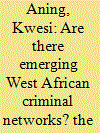

|
|
|
|
|
| Publication |
2007.
|
| Summary/Abstract |
This paper situates discussions about emerging African Criminal Networks (ACN) within Ghana specifically, and West Africa generally, and seeks to present the initial results of an empirically based study on the activities of transnational organised criminal (TOCs) groups in Ghana. The paper argues that the nature of state and statehood in Africa and its inability to establish effective regulatory mechanisms contributes to the rise of these particular types of criminal groups. It begins by conceptualising the place of Ghanaian and West African criminal groups within the framework of international crime. Furthermore, it undertakes an in-depth analysis of three types of crimes; namely computer and internet crime, drug trafficking and (artisanal) small arms manufacture and smuggling in Ghana. By applying a set of standard variables and criteria, the paper evaluates the growth of TNCs in these three issue-areas and how such activities potentially undermine public institutions like the Ghana Police Service (GPS), customs, excise and preventive services (CEPS), judiciary, banking and political parties and political institutions in Ghana. Finally, it seeks to offer an explanatory framework for the growth and acceptance by local communities of the activities of organised crime in Ghana by situating this within a cultural ethos and the social welfare roles played by those involved in such crimes
|
|
|
|
|
|
|
|
|
|
|
|
|
|
|
|
| 12 |
ID:
121080
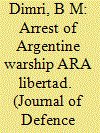

|
|
|
|
|
| Publication |
2013.
|
| Summary/Abstract |
The ARA Libertad Case (Argentina v. Ghana) is the first instance where the International Tribunal for the Law of the Sea (ITLOS), Hamburg, Germany considered the issue of the release of a warship which was detained in a foreign port contrary to the principles of sovereign immunity of warships. The Argentinian warship was detained based on a commercial case filed by an American hedge fund against Argentina in the Ghanaian Court. According to the Court, Argentina had waived sovereign immunity in respect of the claims of the bondholders and, therefore, the warship could be arrested for execution of a monetary claim. This article examines the ITLOS order at the backdrop of warship rights and duties under the International Law of the Sea.
|
|
|
|
|
|
|
|
|
|
|
|
|
|
|
|
| 13 |
ID:
168658
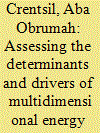

|
|
|
|
|
| Summary/Abstract |
Improving household access and use of clean energy has been central to global development efforts in recent years. The negative effects of energy poverty on health, climate, livelihoods and economy has led to increased investments towards achieving universal access to clean energy. However, significant deprivations in clean energy remains, especially in developing countries. Energy poverty may involve simultaneous deprivations on availability and affordability of clean energy. Using repeated cross-sectional data, this paper assesses the extent and determinants of multidimensional energy poverty in Ghana between 2008 and 2014. The paper finds that though the level of multidimensional energy poverty reduced in Ghana between 2008 and 2014, the incidence and intensity of multidimensional energy poverty remains high. Further, we find substantial subgroup differences in multidimensional energy poverty. The results reveal significant relationships between household characteristics and the multidimensional energy poverty status of households. The reductions in multidimensional energy poverty were driven by the coefficient effects attributable to structural and policy changes over the period. To facilitate universal access to clean energy and reduce the degree of multidimensional energy poverty, there is the need to intensify the LPG promotion campaign and adopt strategies that target left-behind and underserved groups.
|
|
|
|
|
|
|
|
|
|
|
|
|
|
|
|
| 14 |
ID:
077738
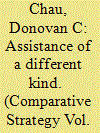

|
|
|
|
|
| Publication |
2007.
|
| Summary/Abstract |
The recent spotlight on Communist China's relations with African nations is not the first time it has occurred, nor will it be the last. In the 1960s, similar commentators and supposed scholars on the subject brought attention to the "Red Peril" or "Red Invasion" descending onto Africa. The past obsession was with Communist expansionism; the current one, with access to raw materials and natural resources. What past and current assessments fail to account for fully, however, is Chinese grand strategy - and one grand strategic instrument, in particular, called political warfare. Long ago discarded and ignored by the Western powers, political warfare, rightly understood, is a nonviolent instrument of grand strategy involving coordinated activities that have tangible effects on intended targets. China on the African continent used this assistance of a different kind in the past and continues to use it today. This historical case study of Chinese political warfare in Ghana sheds light on China's past operations in Africa, which has direct implications for its current policies and potential responses to them
|
|
|
|
|
|
|
|
|
|
|
|
|
|
|
|
| 15 |
ID:
141816
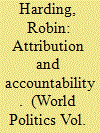

|
|
|
|
|
| Summary/Abstract |
Do voters in Africa use elections to hold governments accountable for their performance in office? In contexts of limited information and weak state capacity, it can be difficult for citizens to attribute the provision of public goods and services to political action. As a result, voters often have little information about government performance on which to condition their electoral support. Such contexts are frequently characterized by clientelism or ethnic politics, and there is a widespread impression that African elections are little more than contests in corruption or ethnic mobilization. Using an original panel data set containing electoral returns and detailed information on road conditions throughout Ghana, the author provides robust evidence that when a public good can be attributed to political action, as is the case with roads in Ghana, electoral support is affected by the provision of that good. The author also uses data on a variety of educational inputs to test the claim that votes are conditioned only on attributable outcomes.
|
|
|
|
|
|
|
|
|
|
|
|
|
|
|
|
| 16 |
ID:
027053
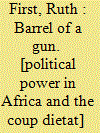

|
|
|
|
|
| Publication |
London, AllentLane Penguin Press, 1970.
|
| Description |
xiii, 513p.hbk
|
| Standard Number |
0713901632
|
|
|
|
|
|
|
|
|
|
|
|
Copies: C:1/I:0,R:0,Q:0
Circulation
| Accession# | Call# | Current Location | Status | Policy | Location |
| 005783 | 960/FIR 005783 | Main | On Shelf | General | |
|
|
|
|
| 17 |
ID:
178004
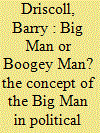

|
|
|
|
|
| Summary/Abstract |
The Big Man has attracted considerable attention from social scientists, both as an explanatory force as well as a phenomenon to be explained. But the concept has become unmoored from its original meaning. Once used to refer to an apex figure within a patrimonial regime, today Big Men are often described as dictators or thieves. I show this using an original dataset covering discussions of Big Men in leading African Studies journals since 1980. I find that authors, especially political scientists, overemphasise theft and underemphasise accountability of Big Men. Then, drawing on my research with Ghanaian local politicians, I show how Big Men are constantly under pressure from their supporters. The paper concludes with a modest call to put the Big Man back in his place as powerful but also empowered, and thus indebted, to those beneath him.
|
|
|
|
|
|
|
|
|
|
|
|
|
|
|
|
| 18 |
ID:
172041
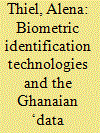

|
|
|
|
|
| Summary/Abstract |
In the global effort to strengthen national identification systems (SDG 16.9), biometric identification technologies and civil registration systems have been associated with different motives and applications, thus fuelling their competition for public attention and resources. The case of Ghana illustrates how these alternative systems, along with further sources of personal data, have recently been integrated into the larger political vision of a centralised, national population data system. Based on ethnographic fieldwork, the paper traces the difficulties and institutional negotiations that accompany this integration into a centralised population data infrastructure. Acknowledging how sets of actors, infrastructures and power relations are layered onto each other to unintended effects, the article describes the historical process of institutional and infrastructural harmonisation in the production of biometric population registers in Ghana.
|
|
|
|
|
|
|
|
|
|
|
|
|
|
|
|
| 19 |
ID:
138861
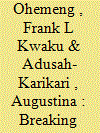

|
|
|
|
|
| Summary/Abstract |
Ghanaian women have made, and continue to make, considerable progress on their journey to the upper echelons of the decision-making institutions of the country. However, the overall number of women in decision-making positions, especially in the civil service, is distressingly small. At the end of 2011, for example, of 36 positions available only six were filled by women, as chief directors of a ministry. What is being witnessed in the civil service, then, is what has been described in the academic literature and popular press as the glass ceiling. This paper examines what has been and is being done by government, and what sort of strategies will be necessary to deal with the problem. The questions addressed are what are the strategies; and how effective are they in breaking down the glass ceiling that appears to exist in the civil service and which prevents women from progressing into senior management. What is the way forward – or up – in breaking through the glass ceiling?
|
|
|
|
|
|
|
|
|
|
|
|
|
|
|
|
| 20 |
ID:
162418
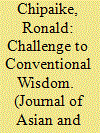

|
|
|
|
|
| Summary/Abstract |
This article makes the point that African states with significant strategic resources and democratic governance systems bargain better in economic and development assistance engagements with China and other partners. In democratic African states, non-state actors play critical complementary roles to the state, leading to multi-faceted forms of African agency. For non-democratic states, a significant limiting factor in their agency is the lack of working relationships between the state and non-state actors. Concomitantly, such states find themselves with weak bargaining and negotiating capacities. If African agency is to be assertive, then state and non-state actors should work together when engaging external partners.
|
|
|
|
|
|
|
|
|
|
|
|
|
|
|
|
|
|
|
|
|